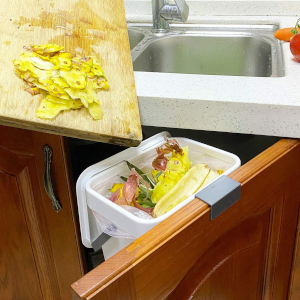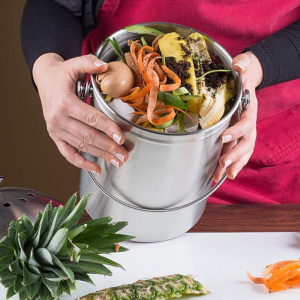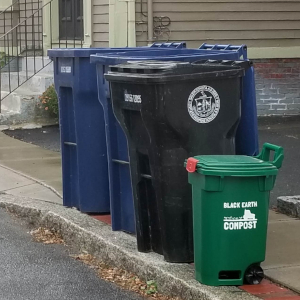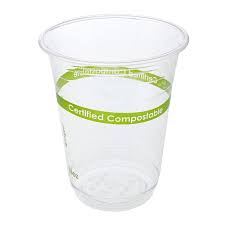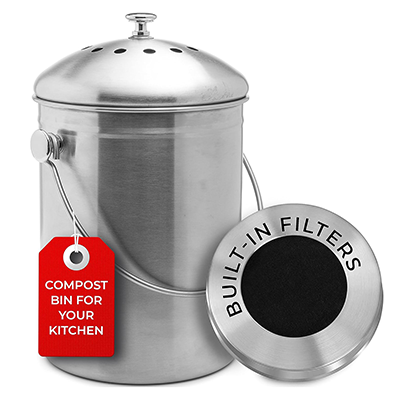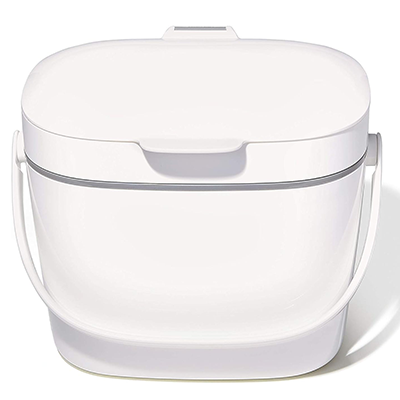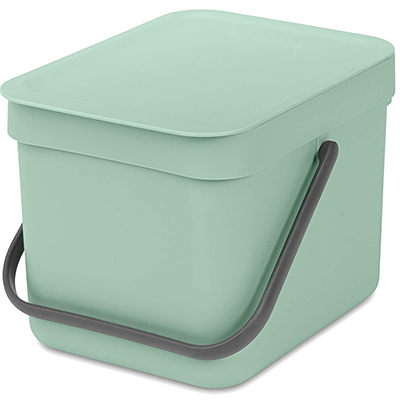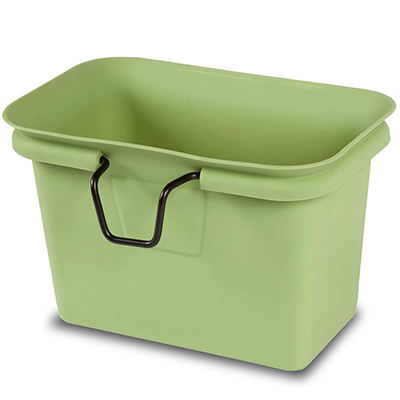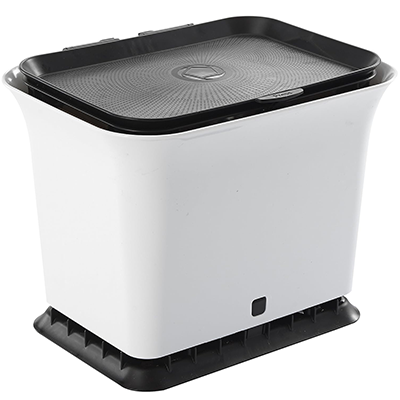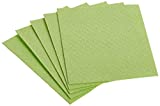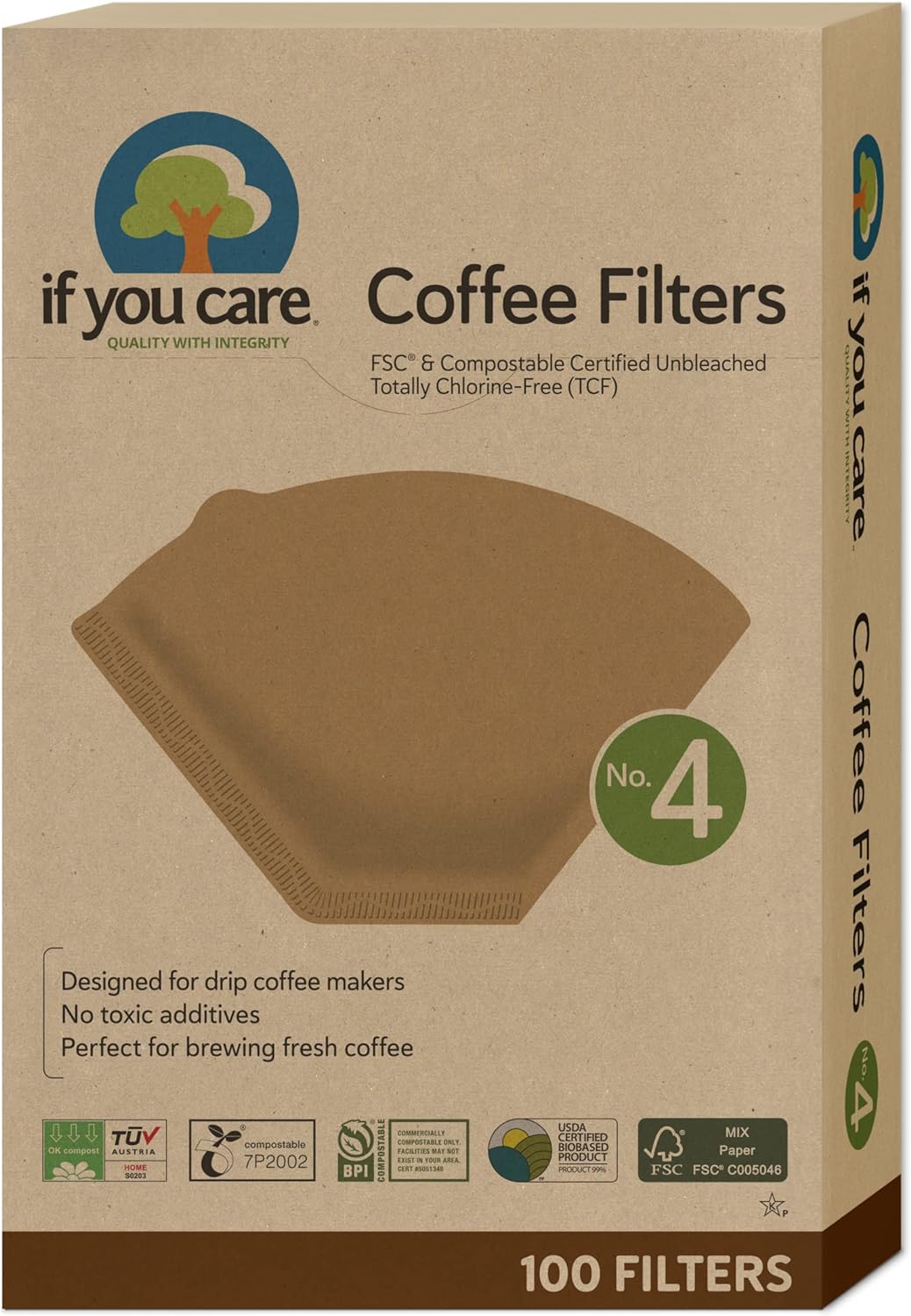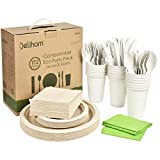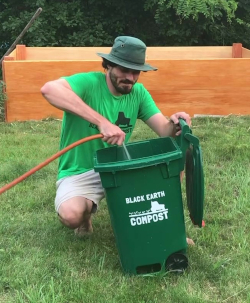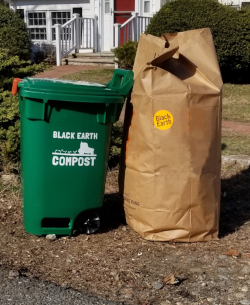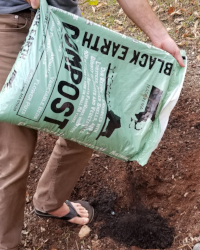Become an Expert Composter!
We only accept the following certified compostable packaging because it ensures PFAS are kept out of the compost, but more importantly it keeps it off your food and body. We test our compost for PFAS and it measures well below state thresholds because we require these certifications. Thank you for helping keep us all safe.
The compostable certifications we accept are BPI, CMA and TUV. Look for these logos on compostable packaging and read more about why certification matters.
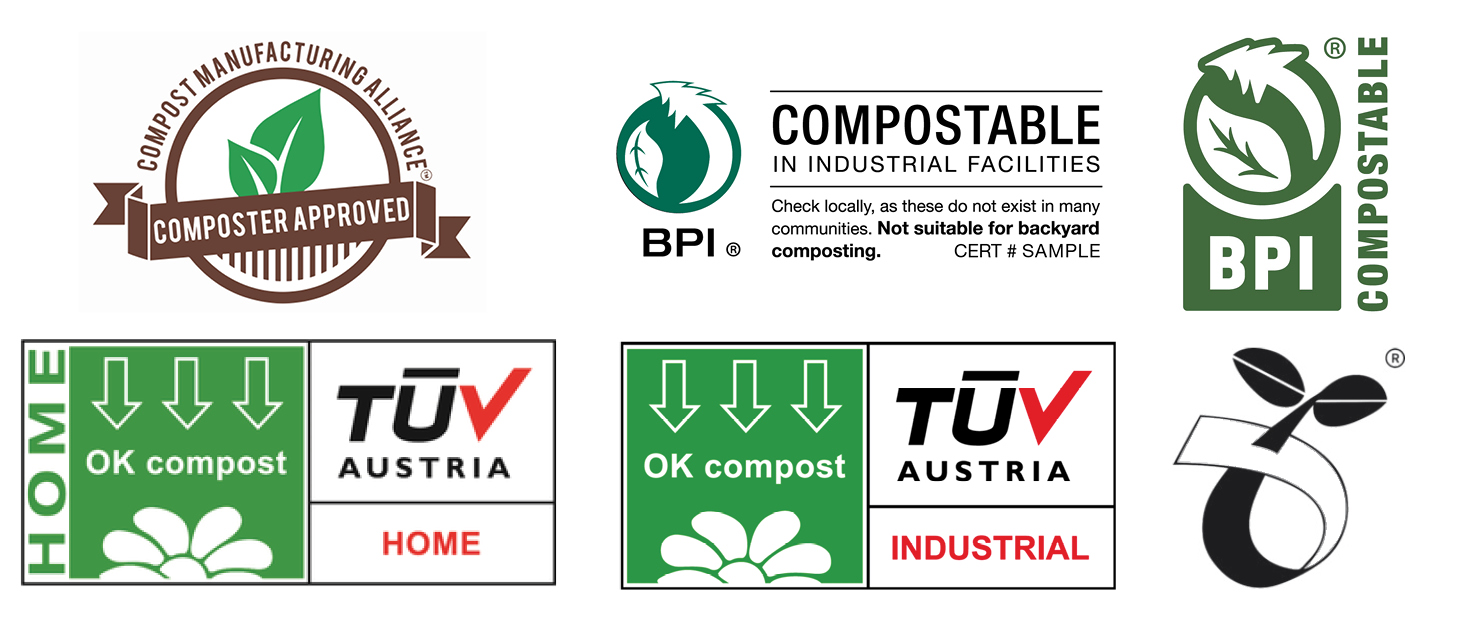
A Kitchen Compost System
Depending on your space and personal preference, one of the following kitchen collection methods should suit you.
- A small kitchen countertop bin to empty often and rinse easily to avoid the use of small liners. A small paper bag can work too if you plan to move it to your curbside bin often.
- A larger kitchen countertop bin with liners to collect waste over several days.
- A large lined bin stored under the sink or another location to collect as many scraps before having to empty.
- Eliminate kitchen countertop clutter with a wall or cabinet mount bin.
- Store your compost in the freezer in a compostable bag or container to eliminate smell.
The more people in your household or the more often you cook, the larger kitchen bin you will need. They fill up faster than you think. For example, our household of four, with two young kids that eat a lot of fresh fruit and vegetables, fill a 1.8 gallon kitchen counter top container about every two days to sometimes once a meal.
These are popular kitchen compost containers available at Amazon that can help you create one of the systems mentioned above.
Line Your Bin
We require the food scraps within the curbside bin be within a liner to ensure the contents empty from the bin and to minimize mess. You can do this by lining your curbside bin with a brown paper bag or certified compostable bag, or lining your kitchen container with certified compostable bags.
Certified compostable bags are available for order from the customer shop and will be delivered on your service day.
Your Online Account
While your in your account check out your compost stats or visit our Sustainable Partners - like minded businesses we work with in your area.
Whats Compostable
Download and print the Detailed Yay or Nay Compost Guide and hang it in your kitchen for quick reference.
Pro Tip: Remove plastic stickers from fruit and vegetable scraps and play our fruit sticker challenge. They won't break down in the compost pile and they are small enough to make it through the finished compost screener.
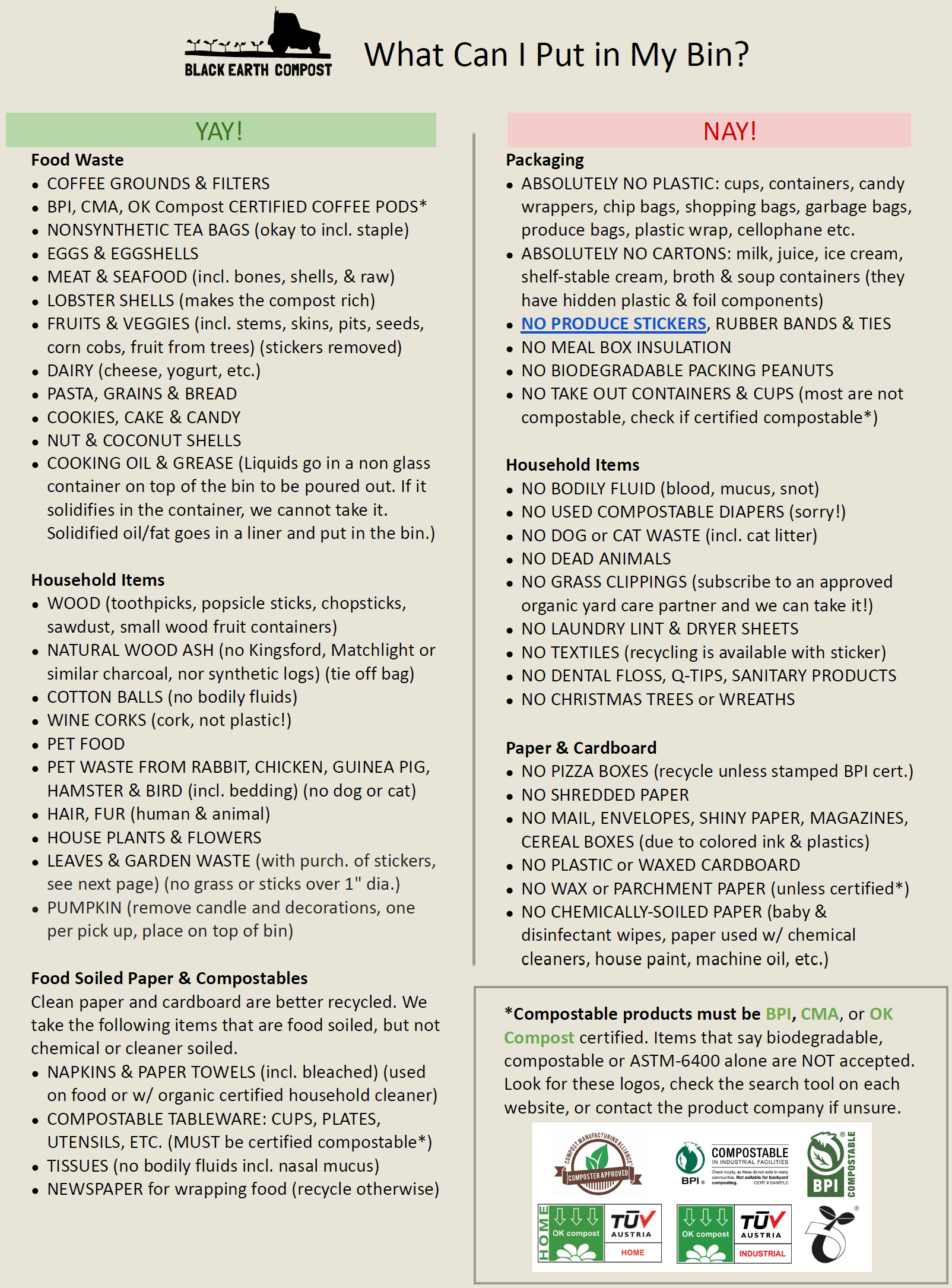
Increase Your Compostable Waste
New products are coming out all the time that can help you inch closer to zero waste. These kitchen products on Amazon are certified compostable and can go right in your compost bin when you are finished with them, decreasing your overall waste. Be on the look out for new certified compostable products as composting becomes more main stream.
Certified compostable Sponge Cloths by If You Care (5 count). They are washable up to 300 times before composting them.
Certified compostable Coffee Filters,100 count. These are chlorine free.
Certified compostable Dinnerware Set including plates, napkins, cups, forks, knives and spoons. Make clean up a breeze at a zero waste event.
While reusable bags are the best, sometimes you need a back up. These BioBag resealable compostable food storage bags are an excellent alternative to plastic sandwich bags.
Discover more compostable products for your kitchen and zero waste parties on our Compostables page.
Understand Compost Terms and Certifications
What is Compostable Packaging?
In an effort to move away from single use plastics and reduce waste, new compostable materials are being developed to replace traditional plastic and styrofoam packaging. These products are made out of bioplastics and other plant based material.
Bioplastics are plant based 'plastic' made out of corn starch,
cellulose, and soy. Often created from the by products of agriculture - think corn stalks. Many bioplastics are grown in the US or Canada, manufactured in the US or Canada and returned to the soil in US or Canada. Bioplastics can have a lower carbon footprint, traveling far less than tradition plastic and being reincorporated into the soil when disposed of at a composting facility. Not all bioplastics are compostable, so please look for the certified compostable label.
Why Does Compostable Certification Matter?
A certified compostable bioplastic or other organic material meets several criteria that ensure it will break down in a compost pile within a set amount of time and into safe material. There are several different standards across the US and Europe that are certified by third party groups to ensure the products meet the standard, and in some cases exceeds the standard.
We accept the following third party certifications:
Look for their logos on packaging. If you are unsure about a product, each company has a look up tool on
their website, linked above. If you still don't know, email the
company that sells the product. They are more likely to know than us.

The words biodegradable, compostable or ASTM-6400 alone are not enough for us to accept a product. It needs to be third party certified to ensure it breaks down into acceptable non-toxic substrates.
Certified compostable products are great for the compost pile because they:
- Break down completely within three months
- Are a good source of carbon for the compost pile, to balance the nitrogen from food waste.
- Add structure to the compost pile, aiding in aeration.
- Move us closer to a world of completely renewable waste.
We currently use single use plastic for our bagged compost, but are on the search for a replacement and are hopeful. We need to keep advancing the development of materials to fully reduce our dependency on single use plastic.
What's the Difference Between Compostable and Biodegradable?
Many products are misleadingly labeled biodegradable, however
compostable and biodegradable are not the same. All compostable products
are biodegradable but not all biodegradable products are compostable. The primary differences between the two being the time it takes to break down the material and what the material breaks down into.
Compostable products are capable of breaking down into natural elements in an industrial compost environment.
Because it’s broken down into its natural elements it causes no harm to
the environment. The breakdown process for certified products takes about 90 days. The
ASTM
defines compostables as anything that undergoes degradation by
biological processes during composting to yield CO2, water, inorganic
compounds and biomass at a rate consistent with other compostable
materials and leaves no visible, distinguishable or toxic residue.
ASTM defines biodegradable as anything that undergoes degradation resulting from the action of naturally occurring microorganisms such as bacteria, fungi, and algae, without consideration for time or what the product is broken down into. So while a product may break down in nature, aka, biodegrade, it is not guaranteed that it's byproducts are safe for compost.
The words compostable or biodegradable alone are not enough to verify a product is suitable for your compost bin. We only accept third party certified products by BPI, CMA, TUV or OK Compost.


